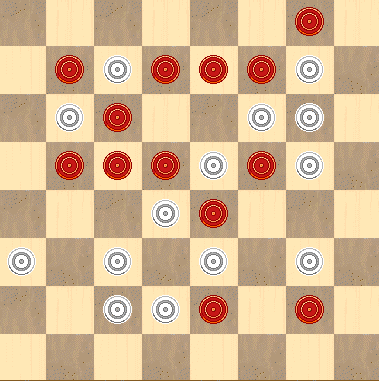

According to the dictionary the word 'quint' (or 'quintuplet' ), means "a combination of five of a kind." The game Quint (Kvint) is a new invention by me (Nov. 2005). The game is inspired by older games, such as certain 5-in-a-row games on the Go board, and also ancient Egyptian Siga.
The game is played on a chess/checkers board, alternatively the smallest Go board, when the 8x8 cells are used. The goal is to achieve five-in-a-row; a quint. Diagonals don't count. In the first stage pieces are dropped on the board, one by one. When all pieces are dropped they may move one step orthogonally in all directions. An enemy piece is captured by surrounding it with two of one's own, either horizontally or vertically (so called interception-capture). Capture is not mandatory. Just as in Go-Moku 'overlines' don't count (i.e., 6-in-a-row, or more). Stalemating or reducing enemy pieces to zero also count as win, but this occurs very seldom.
When dropping pieces, one should keep in mind that a 4-in-a-row, or a quad (defined in the dictionary as "a combination of four of a kind,") will become dangerous in the second part of the game, as there exists a threath to extend the line. Generally, one should not let enemy pieces achieve an unchallenged majority on the periphery, because then these can later, undisturbed, be regrouped to achieve a quint.
Discussion
Since only orthogonals are used this game does not suffer from that "first move advantage" that plagues other five-in-a-row games. An interesting complexity is still maintained thanks to the second phase when interception-capture (custodian capture) is used. The simplicity of rules, the moderate level of complexity, and the fact that it is played on a regular chessboard, makes me enthusiastic over this game.
The game can be played with differing amounts of pieces. I have implemented versions with 15, 20, and 25 pieces. I don't know which is the best. Possibly, it could occur that both opponents' pieces are reduced to less than five pieces, but the game doesn't stop there because one could still win by way of stalemate or by removing all the opponent pieces. Note that the games Pente and Ninuki-Renju are much different as in these games diagonals are utilized, the board is bigger, and interception occurs on two pieces in a row.
You can download my free Quint program here (updated 2005-12-10), but you must own the software Zillions of Games to be able to run it.
© M. Winther 2005